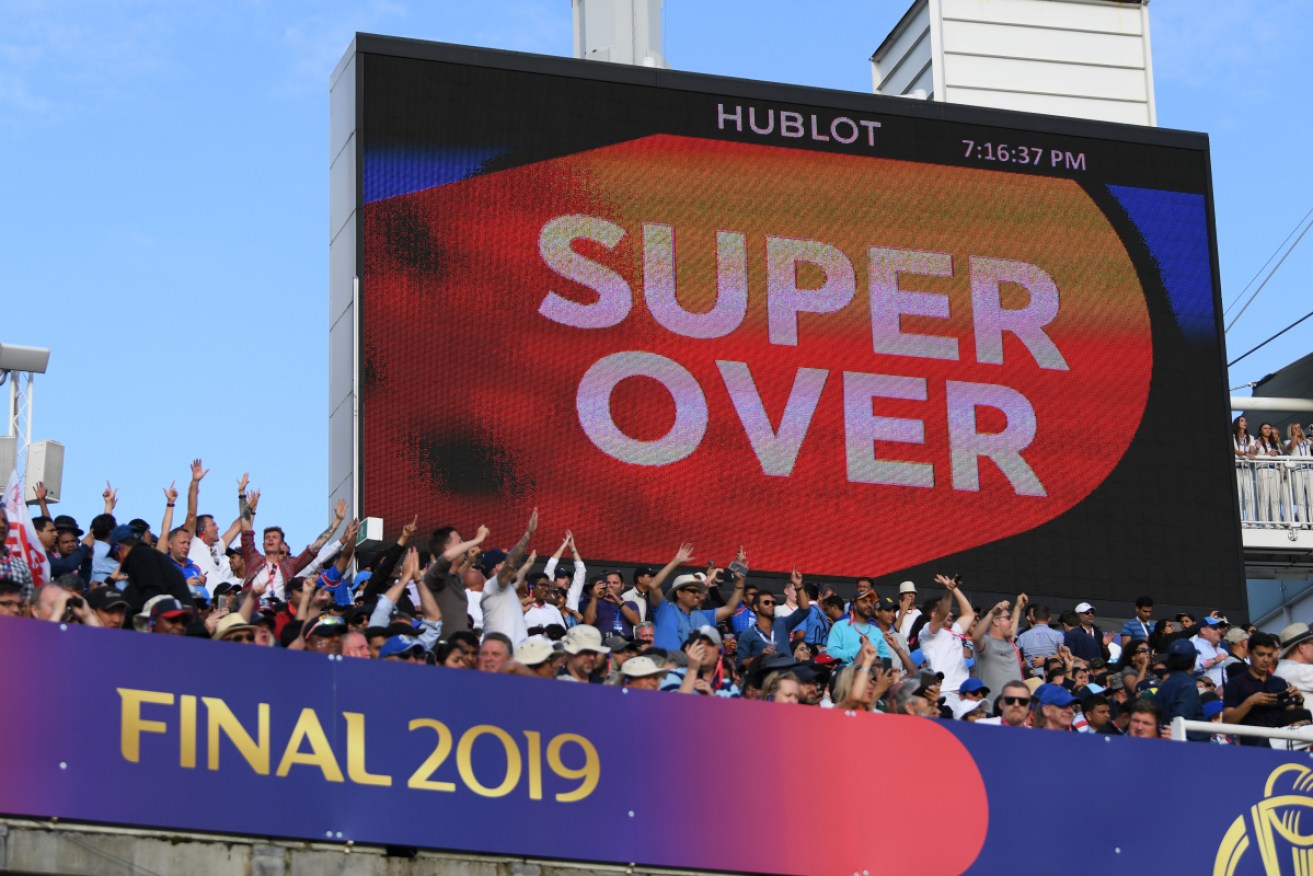How sport’s tightest finishes are being cut short


The super over has been hailed in England after that nation's World Cup win. Photo: Getty
After world sport’s Mad Monday, one thing is clear – Roger Federer and the New Zealand cricket team now know the shattered ‘what-ifs’ of every soccer player on the wrong end of a penalty shootout.
Indeed, after witnessing a ‘super over’ decide cricket’s World Cup and a fifth-set tiebreaker end Wimbledon, there’s an argument that we still don’t know if England is the best one-day cricket team in the world, or if Novak Djokovic really was the best man on the court at the All England Club.
Be you on the side of thrilling finishes or unfair anti-climaxes, there’s little doubt that in recent years sport has moved towards ending its tight contests early. But one wonders why?

England’s Chris Woakes consoles NZ’s Martin Guptill after the dramatic finish. Photo: Getty
Because surely if the ICC is going to insist on a month of cricket between second-string nations it could handle a few more minutes of TV scheduling for a second, or even a third, ‘super over’ rather than deciding a World Cup by counting boundaries.
We can’t all be desperate to see those animal stories on the 6pm news.
And if Federer and Djokovic cannot be separated after a 7-6 (7-5) 1-6 7-6 (7-4) 4-6 13-12 (7-3) classic over four hours and 57 minutes, there must surely be a case to let them bang away in mild weather for another 10 minutes to see who has the superior fitness.
“I respect whatever the rule is,” a wrung-out Federer told reporters when asked what he thought of the premature end to his Wimbledon title dream.
“So really, it is what it is, you know?”
Even the perpetually smiling New Zealand cricket captain Kane Williamson seemed lost for platitudes to explain how his team had lost, despite ending the regulation innings tied, but with two more wickets intact than hosts England.
Tweet from @cricketworldcup
What is clear is that sport in recent years seems to have moved away from the notion of letting games run or, heaven forbid, let a draw stand.
Partly the move has been driven by the need to provide more predictable broadcast scheduling, but the rise of sport science has also highlighted the stresses on athletes’ bodies.
In many sports – even after feature events – there’s always next week and professional athletes are assets only if they can stay on the field of play.
Sporting bodies have also worked out that replayed events are often pale imitations of the original contest and that it is better to maintain the drama and excitement of ‘one day only’ events.
In the AFL after St Kilda failed to show up for the 2010 replayed grand final, the league moved in 2016 to abolish the grand final replay.
As a sports editor who has had to defer an interstate holiday because of a replayed match, I can tell you the struggle is very real to get everyone back and in peak form a week later.
Any drawn match on the big day would now be resolved by two five-minute periods of extra time. If it is still a draw after extra time, play continues until the next score.
But we should not forget that the draw can provide its own drama.
In the NRL on the weekend the New Zealand Warriors and Brisbane Broncos fought out a thrilling draw, which was only declared after a golden goal extra-time period could produce no tries and six missed field goal opportunities.
Ultimately, a draw seemed a fitting result given neither side could break the other.
In soccer the penalty shootout has long been a controversial – if now integral – part of big tournament play.
It was first introduced in 1978 for the World Cup, but only used for the first time in 1982, with two finals in 1994 (Brazil d Italy) and 2006 (Italy d France) deciding the ultimate winners.
As for super overs, it’s a concept from Twenty20 cricket that only gained acceptance over the past 10 years.
It has been used on numerous occasions in relatively minor matches, but given the controversy over the frantic final moments of the World Cup, the ICC will be tempted to review how the system worked on such a big stage.
Tweet from @cricketworldcup
At Wimbledon, the tiebreaker came about after many other tournaments – including the 2019 Australian Open – adopted similar out clauses for long matches.
In Australia the pressure had been on to end long matches played in hot weather that was exhausting players and officials.
“This longer tiebreak also can lessen some of the serving dominance that can prevail in the shorter tiebreak,” Australian Open director Craig Tiley said at the time.
The All England Club made its change after “a thorough review” in the wake of last year’s six-and-a-half-hour men’s semi-final between Kevin Anderson and John Isner, which left Anderson easy prey for Djokovic in the final.
After the match Anderson told reporters: “Of course my body didn’t feel great. It’s not going to when you’ve played so much tennis”.
Club chairman Philip Brook told The Guardian that the move struck a balance “between allowing players ample opportunity to complete the match to advantage, while also providing certainty that the match will reach a conclusion in an acceptable time frame”.
Tell that to Roger Federer today.








